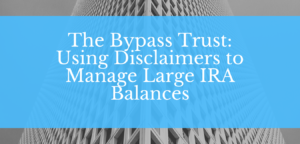IRS Is a Lot More Open to Compromise These Days
It used to be that if you owed a large debt to the IRS you didn’t have a great chance of catching a break. Even though the IRS has always been able to compromise, at least a little, the tax agency has never been really eager to do so. Some people might not even be aware that this was a possibility, but it is. It’s called an offer in compromise and it gives taxpayers with overwhelming debt the chance to pay off that debt for less than the total amount owed.
During the 10 years between 2000 and 2010 the IRS accepted somewhere in the neighborhood of 25-30 percent of these petitions on average, but never reached the 40 percent threshold. However, recently, especially during the last three years the IRS seems to have become a lot more charitable with offers in compromise. That’s good news for taxpayers with large amounts of tax debt.
In the 2012, the IRS accepted 24,000, or 38 percent, of these offers and that number jumped to 31,000, or 42 percent in 2013. In 2014, the number dipped slightly to 27,000 accepted offers, or 40 percent. Typically the IRS does not accept OICs if the agency feels that the taxpayer has the means to pay off the entire debt. However, every situation is different, so if you are considering making an offer in compromise to the IRS to settle your tax debt, then you might want to speak with an experienced tax accountant from GROCO first, in order to weigh your options. You can contact us by clicking here or by calling 1-877-CPA-2006.
Land Management: Conservation Easements
Land Management: Conservation Easements Real property–land and the home or other structures on it–often has special significance to the family that owns it, to the surrounding community or to the ecology of the area. It may have played a role in an historical event; provide habitat for wildlife; command a magnificent view; or offer access…
Personal Finance 101
Personal Finance 101 The subject of personal finance is very broad, but as a beginning, I would like to discuss what I consider the foundations of personal finance: Security, Stability, Growth and Protection & Management. Security Security to me means that I am prepared for the “hit by a bus” scenario. I have life insurance…
Saving for Retirement: 5 Steps to Building Significant Wealth
Saving for Retirement: 5 Steps to Building Significant Wealth Are you saving enough money for retirement? Do you know how much money you need to accumulate in order to retire? Are you concerned about how you should be saving for retirement? The simplicity of these questions can lead many people to believe that there is…
The Bypass Trust: Using Disclaimers to Manage Large IRA Balances
The Bypass IRA Trust: Using Disclaimers to Manage Large IRA Balances By Mary Kay Foss California CPA, December 2001Trying to fund a bypass trust can be problematic if clients only have a residence and a large retirement plan as their major assets. On the surface, a residence isn’t a good asset for a bypass trust…



